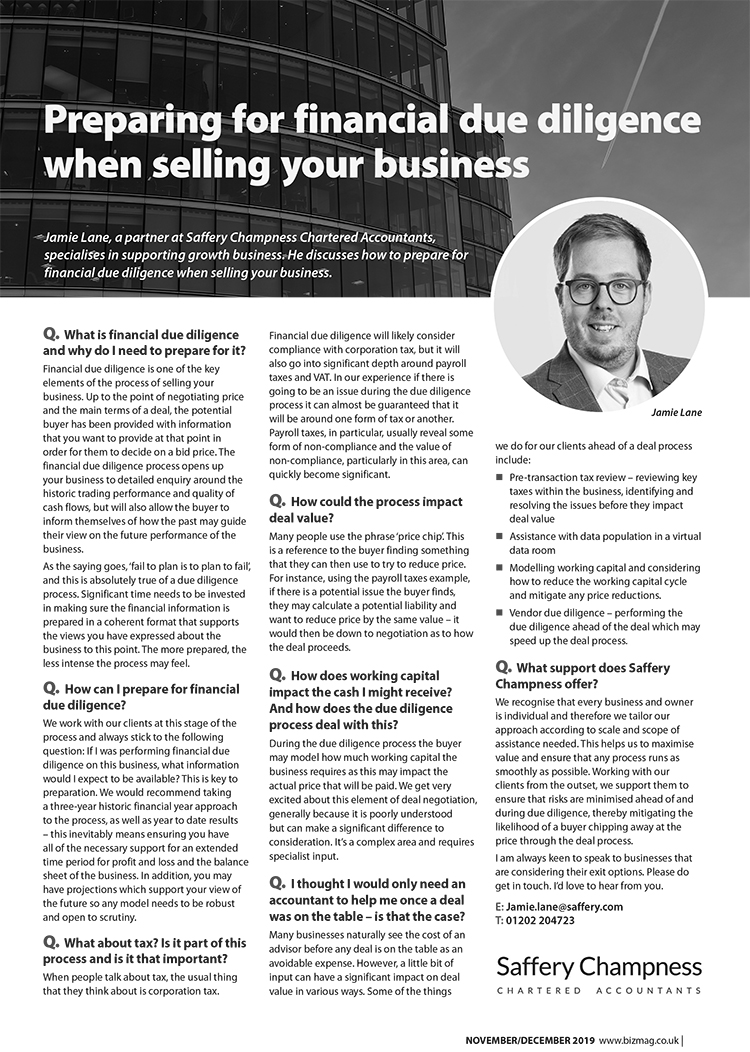Jamie Lane, a partner at Saffery Champness Chartered Accountants, specialises in supporting growth business. He discusses how to prepare for financial due diligence when selling your business.
Q. What is financial due diligence and why do I need to prepare for it?
Financial due diligence is one of the key elements of the process of selling your business. Up to the point of negotiating price and the main terms of a deal, the potential buyer has been provided with information that you want to provide at that point in order for them to decide on a bid price. The financial due diligence process opens up your business to detailed enquiry around the historic trading performance and quality of cash flows of the business, but will also allow the buyer to inform themselves of how the past may guide their view on the future performance of the business.
As the saying goes, ‘fail to plan is to plan to fail’, and this is absolutely true of a due diligence process. Significant time needs to be invested in making sure the financial information is prepared in a coherent format that supports the views you have expressed about the business to this point. The more prepared, the less intense the process may feel.
Q. How can I prepare for financial due diligence?
We work with our clients at this stage of the process and always stick to the following question: If I was performing financial due diligence on this business, what information would I expect to be available? This is key to preparation. We would recommend taking a three-year historic financial year approach to the process, as well as year to date results – this inevitably means ensuring you have all of the necessary support for an extended time period for profit and loss and the balance sheet of the business. In addition, you may have projections for the business which support your view of the future so any model needs to be robust and open to scrutiny.
Q. What about tax? Is it part of this process and is it that important?
When people talk about tax, the usual thing that they think about is corporation tax. Financial due diligence will likely consider compliance with corporation tax, but it will also go into significant depth around payroll taxes and VAT. In our experience if there is going to be an issue during the due diligence process it can almost be guaranteed that it will be around one form of tax or another. Payroll taxes, in particular, usually reveal some form of non-compliance and the value of non-compliance, particularly in this area, can quickly become significant.
Q. How could the process impact deal value?
Many people use the phrase ‘price chip’. This is a reference to the buyer finding something that they can then use to try to reduce price. For instance, using the payroll taxes example, if there is a potential issue the buyer finds, they may calculate a potential liability and want to reduce price by the same value – it would then be down to negotiation as to how the deal proceeds.
Q. How does working capital impact the cash I might receive? And how does the due diligence process deal with this?
During the due diligence process the buyer may model how much working capital the business requires as this may impact the actual price that will be paid. We get very excited about this element of deal negotiation, generally because it is poorly understood but can make a significant difference to consideration. It’s a complex area and requires specialist input.
Q. I thought I would only need an accountant to help me once a deal was on the table – is that the case?
Many businesses naturally see the cost of an advisor before any deal is on the table as an avoidable expense. However, a little bit of input can have a significant impact on deal value in various ways. Some of the things we do for our clients ahead of a deal process include:
- Pre-transaction tax review – reviewing key taxes within the business, identifying and resolving the issues before they impact deal value
- Assistance with data population in a virtual data room
- Modelling working capital and considering how to reduce the working capital cycle and mitigate any price reductions.
- Vendor due diligence – performing the due diligence ahead of the deal which may speed up the deal process.
Q. What support does Saffery Champness offer?
We recognise that every business and owner is individual and therefore we tailor our approach according to scale and scope of assistance needed. This helps us to maximise value and ensure that any process runs as smoothly as possible. Working with our clients from the outset, we support them to ensure that risks are minimised ahead of and during due diligence, thereby mitigating the likelihood of a buyer chipping away at the price through the deal process. I am always keen to speak to businesses that are considering their exit options. Please do get in touch. I’d love to hear from you. E: Jamie.lane@saffery.com T: +44 (0)1202 204723

